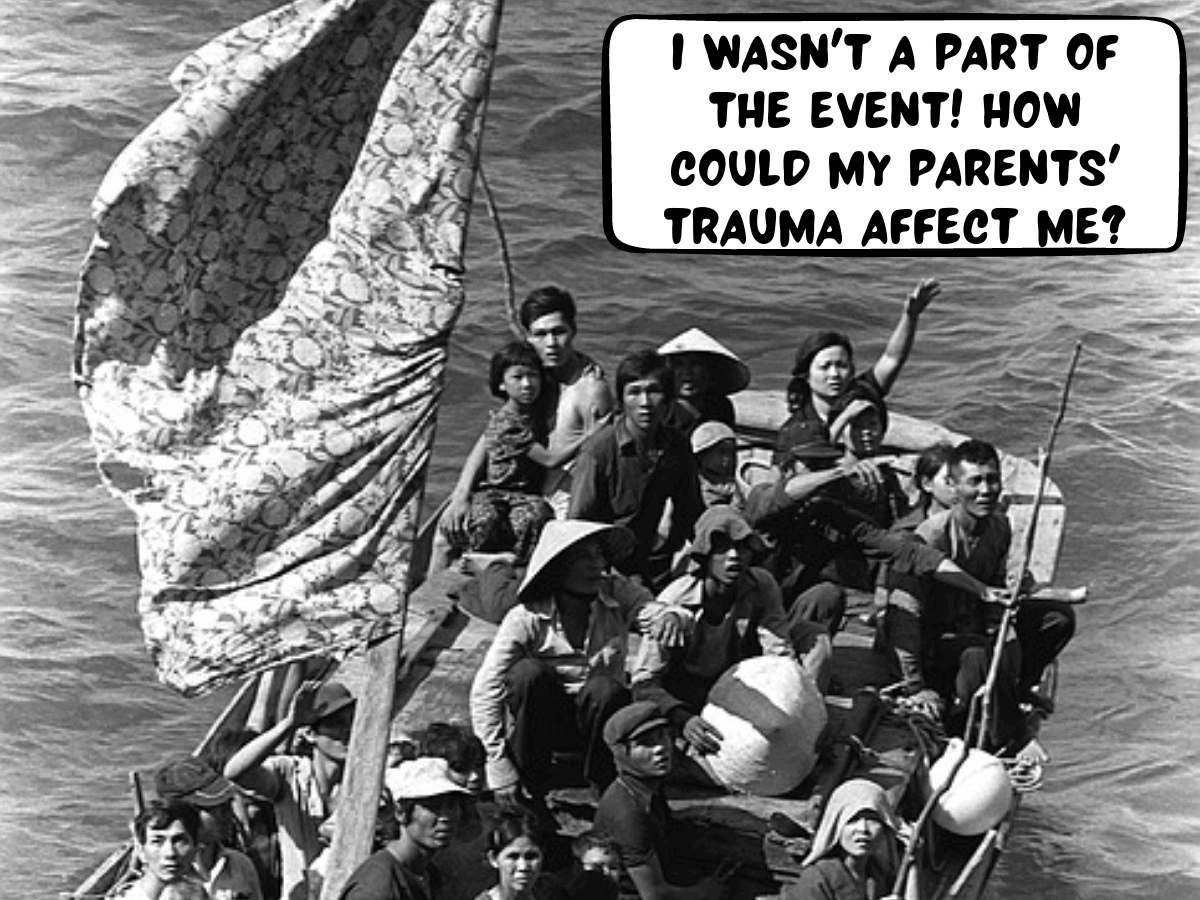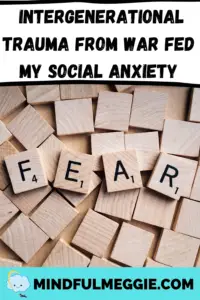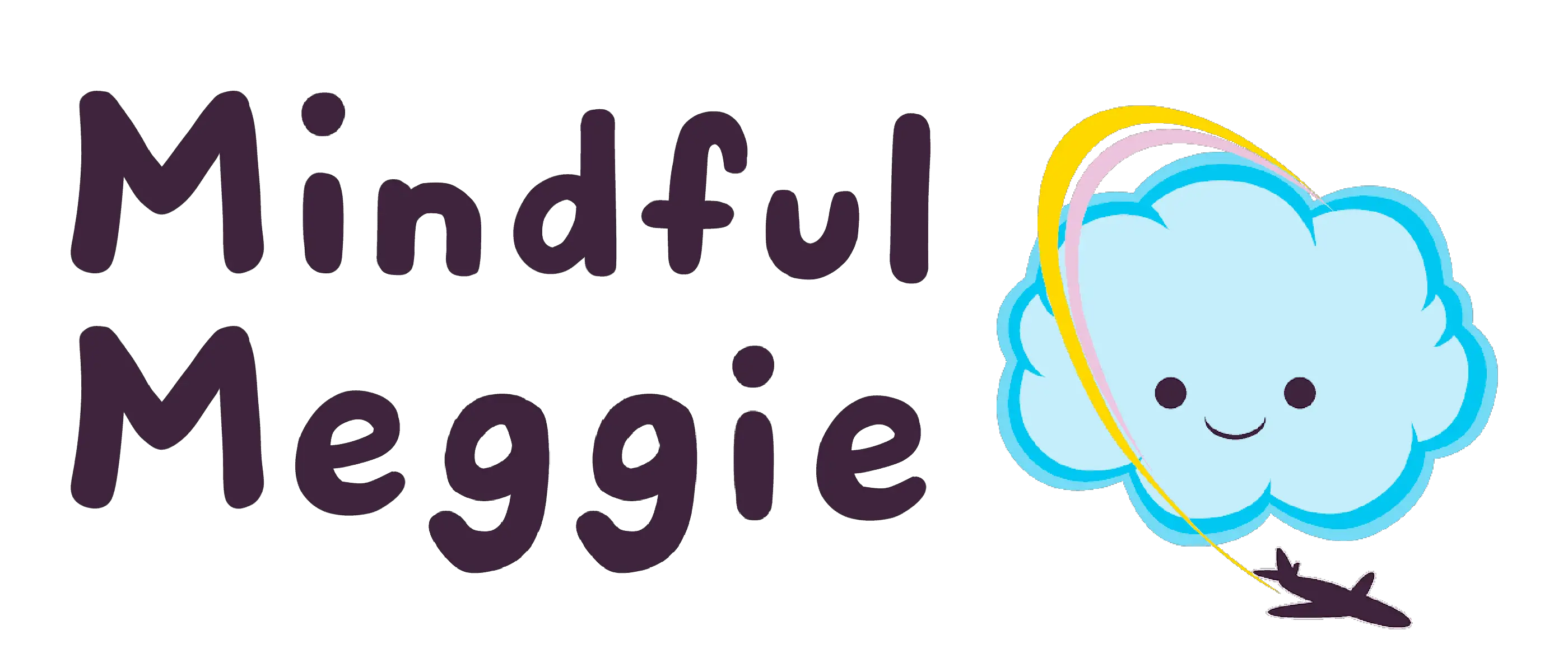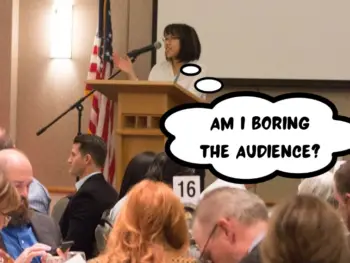
Posted: April 30, 2021 1975
When writing the original posting date, I was almost tempted to write “1975” instead of “2021.”
Because in my household, it still feels like Saigon has just fallen, that we’ve been caught in postwar woes. Time — the Vietnam War ended exactly 46 years ago — is a futile healer of my parents’ war trauma.
Although their traumatic environment belongs to the past, their trauma can linger to the irrelevant present day, bringing unnecessary, unintentional mental harm to their child, to me.
Not only did I develop social anxiety disorder, but I constantly felt like an inadequate bastard.
***
From the moment I joined elementary school, my brain wanted me to feel like people were singling me out on purpose, that’d I’d be the odd-one out for life. Although I believed the fake barrier between me and other people, I didn’t care that I was lonely in school. I had my books, video games, and most of all, my loving parents.
But I’d been neglecting my lifelong symptoms of social anxiety for too long. In 2020, I started to feel like someone painted a red bullseye on my back, as if everyone in the world wanted to target me, their arrows stained with hatred and criticism.
Because of 2020’s COVID-19 pandemic, my worsening symptoms didn’t occur while I was public speaking on a stage or meeting people face-to-face, but during Zoom calls. I feared for my life to turn on my camera and show my face. I was afraid to say anything because it felt like people would start criticizing me for being an absolute dumbass behind my red-painted back.
My brain, wanting to protect me from “danger,” told me that I had to be silent. But the more Zoom calls I joined in silence, the more my fear of showing up in front of people grew. I really believed that I was an oddball with something intrinsically wrong, that I’d always be inferior to other people.
Whenever I did participate in Zoom calls by typing messages into the chat, my brain told me that I wasn’t worthy to do so because nobody replied to my messages. The most painful experience was when I shared a wrong answer to a lighthearted quiz question — and everyone else got it right. After the session, I strode to my backward and cried for half an hour.
No wonder why people hate you. You’re an incorrigible weirdo! A stupid ass! It is what it is, my brain told me.
I originally came to my culturally competent therapist for social anxiety, but soon learned that I had to confront deeper issues that had were lurking underneath it.
First, I had to take a time machine into the past. I asked my parents about their postwar hardships, educated myself about Vietnam’s turmoil in the 20th century, and reflected on my childhood.
Although these insights have helped me embrace my Vietnamese heritage, history, and culture, the end goal was to use them for eye movement desensitization and reprocessing (EMDR) in my therapy sessions.
As my eyeballs followed a blue ball bouncing horizontally on the computer screen like a simple screensaver, I clung onto the present while diving into my past for the hurtful memories that’ve come up out of nowhere.
When my therapist pulled me back into the present by stopping the blue ball and asking me about any thoughts, feelings, and emotions I’ve felt, I would start blabbing on and on about them. My therapist responded with their own insights and wisdom to help me understand why I was feeling the way I was.
During these EMDR talks, I uncovered a life-changing revelation that clarified everything: I’ve been suffering from intergenerational trauma passed down to me from my parents, which eventually fueled my extreme social anxiety.
***
It doesn’t matter if we are living in a safe home in 21th-century America. In each of their own ways, my mother and father still live as though their lives are in danger. Their postwar trauma has made them high-strung in their behavior.
My parents’ trauma isn’t a weakness, a fault in their character, or an event. It’s their bodies’ hard-wired, survivalist response to a potentially dangerous event, which is the postwar era in Vietnam.
But the trauma didn’t end when the event did. Without treatment, it has continued well into my parents’ senior years — and into me, their kid, as intergenerational trauma.
According to psychologists, our environment can change our brain chemistry. Trauma can create new neurochemicals in the brain that can get passed down to the next few generations.
Most scientific research on intergenerational trauma is centered on epigenetics, the study of environmental changes that turn certain genes on and off. In some studies, scientists have discovered that the Holocaust survivors’ children have inherited their genetic changes.
As intergenerational trauma expert Mark Wolynn says, “Three generations share the same biological environment.”
Based on my many visits with therapists, I know that my brain is hardwired to be hyperactive. After all, I was born with chronic obsessive compulsive disorder, which can lead to co-occurring mental health problems like social anxiety. Although there’s no way to find out if my parents passed down any problematic genes onto me, it’s likely, considering they still behave under trauma.
But one thing’s for sure: Not only have I adopted their behaviors and anxious patterns into my life, the core beliefs I have about myself are running low on self-esteem.
***
In the late 1970s, my father made many attempts to escape Communist Vietnam by land or sea. He had to be stealthy, moving quickly as to not get caught by the regime. But he failed them all.
Finally, he caught a boat with other refugees that made it out of the Saigon harbor. After a week drifting aimlessly around the South China Sea, my father would have died from thirst on his 20th birthday if it weren’t for his boat crossing paths with a British cargo ship, which rescued the refugees. They weren’t among the hundreds of thousands of Vietnamese boat people who died trying.
He survived, but so did his trauma.
Decades later, he is still stuck in survival mode, as if his life counts on rushing and being efficient. Everything, even the most menial matter that most people didn’t care about, is high-stakes in his impatient mind and behavior.
When I used to tag along on his grocery errands, he told me to scout ahead for the shortest checkout line. When we stood in one, he would scan around for another line that seemed faster, then switched to it. Often, our original line turned out to be faster, which troubled him even more.
If that wasn’t enough, he constantly complained about the people in the checkout line, even if we were only waiting for two minutes or so. “Ugh, the cashier is so slow! And the customer is taking forever to pay! Why can’t they move any faster?” he said.
My father always competed with time, even if he had no appointments later in the day. Somewhere in his brain, perhaps he was still running away from Communist patrols.
Unfortunately, not only have I adopted his stressful behavior about saving a minute and making everything efficient, but I’ve internalized negative beliefs about myself.
One humdrum morning when the sun was emerging out of the Californian coast and casting a pale yellow light over the earth, I began the line at my local post office, which was mere minutes away from opening. When others started filing behind me, I felt like I was grocery shopping with my dad all over again. A snarling voice in my head, which was my social anxiety taking form from my dad’s old complaining, said, Meggie, you incompetent slowpoke! People are waiting behind you! Hurry up and open the door! Don’t waste a minute of their time!
The postwar Vietnam survival mode flicked on in my head. I sensed danger just because I was beginning a line. Unlike my dad, I was also self-conscious, believing that my presence bothered people.
A pressured and pathetic mess, I opened the door too early. The blinds hanging overhead came crashing down, my mental mess materializing for everyone to see.
But compared to my dad’s survival mode, my mother’s is even worse.
After the Fall of Saigon, my mother struggled to stay alive, hunger always threatening her. She ate whatever she could, even bugs. Because her father was a high-ranking officer in the South Vietnam Army, a black mark tainted her records, preventing her from getting a job in Communist Vietnam.
Today, I see my mom is still that desperate young adult acting like my family is in danger of going hungry. She worries excessively about our physical health — especially mine since I’m her child.
Although I admit I’m a picky eater, I’ve been eating lots of healthy foods and drinking enough water nowadays. But because my mother’s fear of malnutrition gnaws at her, she says to me, “You don’t eat enough vegetables. You don’t drink enough water. You don’t care about your health at all. You’re going to have lots of health problems later on if you don’t eat enough vegetables. Nobody eats enough of them around this house.”
This goes on. All. Day. Long. Even when I’ve followed her directions about eating healthy foods, she will find something else about me to drone about.
My mother doesn’t mean to be as bitter as Brussels sprouts, but her shrill, scathing tone of voice makes others, including me, see her that way. Her critical, constant “reminders” have made me feel like I’ve been born as an inadequate human being because nothing I do pleases her.
Unfortunately, my brain has internalized her voice into my own core beliefs, which is why I keep thinking that I am a stupidhead, never good enough for anything.
If all that isn’t enough, my mom keeps intense eyes and ears on me, always making sure that I don’t fall out of line, as if I am a young solder in the barracks. Sometimes, she scans her eyes from my head to my toes, finding something to correct. Maybe I’m not wearing my in-house slippers (“There’s dust everywhere! Your feet will get so dirty!”). Or my fingernails have grown long (“Germs will get trapped underneath! You could get yourself sick if you eat finger food!”).
Even if my mother isn’t with me, she can hear what I do in another room. One morning, I forgot to drink two cups — it has to be two — of water. Lying in bed and not hearing me pour water out of the pitcher, she said in Vietnamese, “Meggie, drink water!”
My mom’s monitoring has conditioned me to act self-consciously around the house. My brain stays on alert, as if running down a checklist that my mom made. Did you wash your hands long enough? Did you drink enough water? Are you wearing your in-house slippers? Do these things so she won’t keep reminding you every five minutes!
Although my social anxiety began brewing in the house with my mom, it leaked into every other area of my life. My mom’s behavior taught me that the world was a dangerous place where everyone was watching my every move, waiting for me to mess something up. My self-consciousness took over my social life.
***
As a victim of intergenerational trauma passed down by both parents, I developed severe social anxiety in late 2020.
Thanks to my therapy sessions, I’ve learned to question my parents’ behavior, which is rooted in their never-ending need to survive postwar Vietnam.
Because if I don’t, I will keep living like that, too.
Why do I have to stress about saving a minute? Why worry about being fast and efficient in every area of my life?
I’m not trying to escape Communist Vietnam. That was my dad’s doing!
Why must I believe I am inadequate? Why do I feel like everyone is watching me screw up?
No matter what my mom says to me, it has never been about me or my shortcomings. It’s always about her unresolved trauma.
It’s constant work to unlearn and question my socially anxious patterns and negative core beliefs, defaults of my brain and behavior for years.
But I swear, I’ll keep at it.
I don’t blame my parents for the mental pain they’ve unknowingly passed onto their child, whom they love with all their hearts. Militaries and politicians began a war that left millions of people and future generations victimized.
But my parents’ outdated, unresolved traumas are theirs alone, irrelevant to my life in 21-century America. If I internalize them into own mind, it’s only going create more problems for my mental health.
If I suppress my intergenerational trauma, it’s only going to continue haunting me and survive for more generations. Guaranteed or your money back!
So, to heal from the trauma is to let myself feel straight through it, which requires body movement. I am releasing my trauma through my fingers click-clacking over my faded keyboard, writing and sharing my stories.
It has taken me a long time to realize that the trauma and social anxiety hurting my mental health was never about me.
Yet, I must play a different game of survival. Forget about the decades-old postwar. I must survive the lingering trauma in my mind and family.
By understanding trauma’s psychological and behavioral roots, not only can I take care of my mental health and cope with my social anxiety, but it’s my moral duty.
My awareness will save me, my generation, and the next from letting a war that ended decades ago endure through intergenerational trauma.
Together, let’s survive this thing and heal.
For now though, I have to run to the grocery store to buy Brussels sprouts. Don’t worry, this is me speaking, not my trauma.
Share on Pinterest!

Special thanks to the Writing Cycle‘s Carol Test, a writer’s coach who specializes in healing narratives, for your warmth and wisdom!
Featured image by Welcome to all and thank you for your visit ! ツ from Pixabay



 How to Open Up About Your Mental Illness to Family and Friends
How to Open Up About Your Mental Illness to Family and Friends

Wow!! Maggie, this is a beautiful piece. Thank you so much for sharing your story! This must have been so healing to write. Cheers to you for being so vulnerable, that is a tough thing to do even without social anxiety!! I feel that you described the complexity of generational trauma in a thorough and relatable way. Thank you again for sharing!
Oh my goodness, I’m sorry Meggie! In my comment, I spelt your name with an ‘a’. Sorry about that!
No worries! 🙂
And thank you for educating yourself about this. I really appreciate readers like you, Candice. And thanks for your feedback! I do try my best to embrace vulnerability and make the material thorough yet easy to understand. 🙂
Hi Meggie, thank you so much for sharing! I cried the whole time while reading this. My parents were also refugees of the Vietnam War. I painfully relate to every single thing you have talked about. I have been trying to find articles or stories about intergenerational trauma and yours has been the best by far. It is eye opening to learn where our social anxiety, feelings of inadequacy, and low self-esteem come from. Although it is very challenging, I have been actively trying to recognize and overcome these feelings. Thanks again for writing this beautiful piece and I wish you all the best in your healing <3
Hey Sandy! I truly appreciate your trust in opening up to me. I am super glad that our stories resonate. Learning about the past helps us in our present! It’s been a while since I’ve written that article, but the more I learn about my family’s history, the more I am at peace with the present of me and my family. I wish you all the best! -Meggie
Hi em- I really think we should connect. Your story resonates with millions of us Viet Kieu. I work in this space. How can we connect? Are you on Linkedin? Chi My
Hi Chi My, I am glad that my family’s story resonates with other Vietnamese people. Here is my LinkedIn: https://www.linkedin.com/in/meggie-tran/